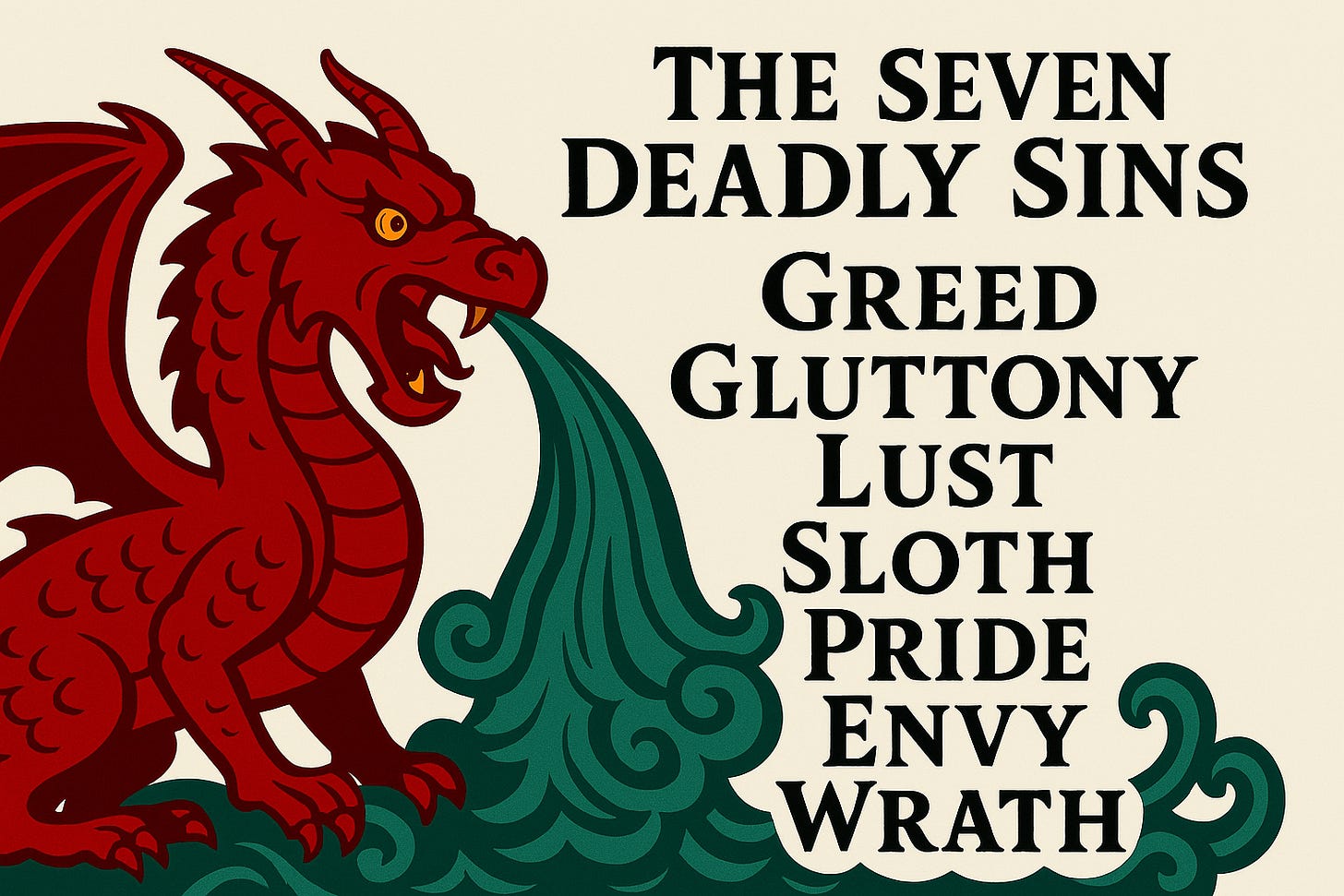“But the earth helped the woman….”Revelation 12:16
I. Recognize the Seven Deadly Sins – an acrostic or acronym
In Revelation 12:15, the serpent spews a flood to overwhelm God’s people—an image of sin’s destructive power when left unchecked. Like a relentless flood, the Seven Deadly Sins threaten to consume us. To resist them, we must first recognize their presence in our lives. The acrostic GarGLe SPEW helps us remember these dangers and actively guard against them.
GarGLe SPEW – The Seven Deadly Sins
• G – Greed (Excessive desire for material wealth)
• G – Gluttony (Overindulgence in food, pleasure, or material things)
• L – Lust (Uncontrolled desire for pleasure, often sexual)
• S – Sloth (Laziness, avoiding responsibility)
• P – Pride (Exalting oneself over God and others)
• E – Envy (Resenting the blessings of others)
• W – Wrath (Uncontrolled anger and vengeance)
The Flood of Sin and God’s Deliverance
Just as the woman in Revelation 12 is protected from the dragon’s flood, God provides a way of escape. These sins corrupt our hearts unleashing predatory impulses. But Jesus born as an unblemished lamb offered up as prey, shows us another way—the way of humility, self-control, and love.
II. The Path to Repentance: Breaking the Narcissistic Cycle – BASH & JAW
Jesus: Bashed in the Jaw Yet Responding in Love
Before introducing the BASH & JAW framework, we must reflect on Christ’s example. Jesus was literally struck in the jaw (John 18:22), mocked, and beaten—yet He did not retaliate. Instead of responding with blame, anger, or humiliation, He responded with love, entrusting Himself to the Father.
Rather than taking the path of pride, vengeance, or self-justification, Jesus demonstrated the ultimate strength—choosing humility over pride, mercy over vengeance, and love over self-defense. His response stands in direct contrast to our fallen tendencies.
When we allow pride and self-justification to control us, we begin to reflect the accusers of Christ—blaming others, defending ourselves, and resisting the call to humility. Jesus, however, entrusted Himself to the Father and endured suffering with grace.
BASH – How We Respond in Sin
When we feel threatened or wronged, our fallen nature tempts us to react in ways that harm rather than heal:
• B – Blame (Shifting responsibility instead of owning mistakes) → Genesis 3:12-13
• A – Angered Response (Lashing out instead of practicing patient endurance) → James 1:19-20
• S – Shame (Shaming others to deflect our own insecurities instead of showing grace) → John 8:7
• H – Humiliate (Tearing others down to feel superior rather than lifting them up) → Philippians 2:3
Even when falsely accused, Christ refused to BASH others (Isaiah 53:7, Matthew 26:62-63). Instead, He surrendered to the Father and remained silent before His accusers.
JAW – The Unrepentant, Stiff-Necked Mindset
These attitudes prevent genuine repentance, keeping us hardened in our pride:
•J – Justifies Self (“I did nothing wrong!”)
The Pharisee justified himself, while the tax collector repented (Luke 18:9-14).
• Jesus, though innocent, did not justify Himself before Pilate (Matthew 27:13-14).
A – Avoids Suffering (“I shouldn’t have to go through this.”)
“No discipline seems pleasant at the time, but painful. Later it produces a harvest of righteousness.” Hebrews 12:11
• Jesus embraced suffering for a greater purpose (Hebrews 5:8).
W – Weakness is Bad (“If I don’t fight back, I am weak.”)
“My grace is sufficient for you, for My power is made perfect in weakness.” 2 Corinthians 12:9
• Jesus showed that true strength is found in surrender to God’s will (Philippians 2:8).
The Pride of Satan vs. The Humility of Christ
Satan, though a created being, epitomized pride and rebellion:
“I will ascend to the heavens; I will raise my throne above the stars of God… I will make myself like the Most High.” Isaiah 14:13–14
Jesus, the eternal Creator, chose the path of love and humility:
“For by Him all things were created—things in heaven and on earth, visible and invisible, whether thrones or dominions or rulers or authorities; all things were created through Him and for Him.” Colossians 1:16
“And being found in appearance as a man, He humbled Himself and became obedient to death—even death on a cross!” Philippians 2:8
Where Satan grasped for greatness, Christ emptied Himself.
Where Satan sought to rise, Christ chose to descend to reveal the Fathers love and so that we might be lifted up.
Loving Our Enemies: The Goal of Transformation
Jesus calls us not only to endure suffering without retaliation but to love those who harm us. This is humanly impossible—but through the power of the Holy Spirit, it becomes possible.
“But I tell you, love your enemies and pray for those who persecute you.” Matthew 5:44
The Pharisees mocked Him. The soldiers struck Him. Yet Jesus loved them.
“Father, forgive them, for they do not know what they are doing.” Luke 23:34
Through the Holy Spirit, we are called to transform our natural responses from BASH and JAW into Christlike endurance, forgiveness, and love.
Turning the Other Cheek: A Radical Act of Trust
Jesus calls us to reject the attitudes exemplified in the acrostics BASH and JAW by embracing the way of the cross:
“If anyone slaps you on the right cheek, turn to them the other cheek also.” — Matthew 5:39
Turning the other cheek is not weakness—it is radical trust in God’s justice.

